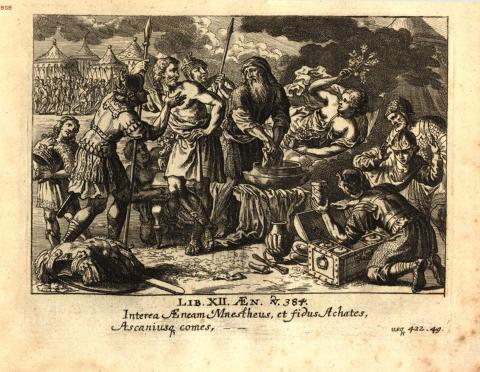CORE VOCABULARY
Turnus, ī, m.: the chief of the Rutulians, 7.56, et al.
intereā: (adv.), amid these things; meanwhile, in the meantime, 1.418, et al.
Aenēās, ae, m.: 1. A Trojan chief, son of Venus and Anchises, and hero of the Aeneid, 1.92. 2. Aenēās Silvius, one of the Alban kings, 6.769.
Mnestheus, and Menestheus, eī and eos, m.: Mnestheus, one of the Trojan chiefs under Aeneas, 5.117; 10.129, et al.
fīdus, a, um: adj. (fīdō), trustworthy, faithful, trusty, 1.188; safe, secure, hospitable, 5.24; w. gen., tuī fīdissima, most faithful to thee, 12.659.
Achātēs, ae, m.: Achates, a companion of Aeneas, 1.174, et al.
Ascanius, iī, m.: Ascanius, son of Aeneas, and traditional founder of Alba Longa, 1.267.
cruentus, a, um: (adj.), bloody, blood-stained, 1.296; covered with blood, 10.498.
alternus, a, um: adj. (alter), one after the other; alternating, 6.121; by turns, in succession, 5.376; every second, 12.233.
nītor, nīsus or nīxus sum, 3, dep. n.: to lean or rest upon, w. abl., 6.760; tread, walk upon, 2.380; to be borne upon, poised or balanced upon, 4.252; push, press, struggle forward or upward; ascend, 2.443.
cuspis, idis, f.: a spear point, 7.817; point, 5.208; spear, lance, javelin; a spear, 12.386; a spear or, perhaps, the shaft of a spear as a scepter, 1.81.
gressus, ūs, m.: a stepping; step, walk, course, way, 1.401; of a ship, 5.162; air, mien, gait, 5.649; ferre gressum, to walk, 6.677; efferre gressum, to go forth or out, 2.753; comprimere gressum, to stop, stay one’s steps, 6.389. (gradior)
saeviō, iī, ītus, 4, n.: to be fierce; to be furious, rage; be angry, 6.544. (saevus)
īnfringō, frēgī, frāctus, 3, a.: to break in; break, 12.387; (fig.), to break down, subdue, 5.784; dishearten, paralyze, 9.499. (in and frangō)
lūctor, ātus sum, 1, dep. n.: to struggle, strive, contend, 1.53; wrestle, 6.643; w. inf., 12.387.
arundō, inis, f.: a reed, arrow, 4.73.
ēnsis, is, m.: a sword, 2.393, et al.; knife, 2.155.
secō, secuī, sectus, 1, a.: to cut, freq.; cut off, 4.704; engrave, carve, 3.464; cut through, cleave, 5.218, et al.; of the channel of a river, 8.63; sail through, pass, 8.96; speed, 6.899; shape out mentally, form, 10.107.
latebra, ae, f.: a hiding place; recess, lodgment, retreat, 12.389; usually in pl., latebrae, ārum, an ambuscade; covert, retreat; cavern, 3.424; recess, cavity, 2.38; the hatches of a ship, the hold, 10.657. (lateō)
rescindō, scidī, scissus, 3, a.: to tear off or away, rase, tear down, 6.583; lay open, 12.390.
penitus: adv. (cf. penes), inwardly, far within, deep, deeply, 1.200; wholly, entirely, 6.737; afar, 11.623; far away, 1.512.
remittō, mīsī, missus, 3, a.: to let go back; send back, 2.543, et al.; send up, 5.99; repay, 4.436; yield up, resign, 10.828; give up, 11.346; forego, lay aside, 5.419; give back, reëcho, 12.929; sē remittere, to submit, yield, 12.833.
adsum, adfuī, esse, irreg. n.: to be near or by; to be present, at hand, or here, 1.595; to have arrived, 2.132; to be with, attend, 2.701; aid, accompany, 10.547; be propitious, 3.116; to beset, 2.330; inf., adfore, to be about to come, destined to come, 7.270. (imp. subj., adforem, -ēs, -et, -ent)
Phoebus, ī, m.: Phoebus or Apollo, 1.329, et al.
dīligō, lēxī, lēctus, 3, a.: to love, 8.590; p., dīlēctus, a, um, loved, dear, 1.344.
Iāpyx, ygis, m.: a son of Iasius and physician of Aeneas, 12.391.
Īasidēs, ae, m.: a son or descendant of Iasius. 1. Palinurus, 5.843. 2. Iapis, 12.392. (Iasius)
Apollō, inis, m.: Apollo, son of Jupiter and Latona; the god of prophecy, medicine, music, poetry, and archery, 2.430; met., a temple of Apollo, 3.275.
augurium, iī, n.: the business of the augur; augury, divination, 1.392; an augury, omen, portent, 2.703; oracle, 3.89; presage, 5.523. (augur)
cithara, ae, f.: the cithara, cithern, or lute, 1.740.
sagitta, ae, f.: an arrow, 1.187, et al.
dēpōnō, posuī, positus, 3, a.: to put down or aside; recline, 7.108; put off, from, put on shore, 5.751; lay down, lay, 6.632; lay aside, dismiss, banish, 2.76; (pass., of sickness), to be laid down, dying, despaired of, 12.395.
prōferō, tulī, lātus, ferre, irreg. a.: to carry forward or forth; extend, 6.795; postpone, delay, 12.395.
herba, ae, f.: any grassy or herbaceous growth; grass, turf, 1.214, et al; fodder; herb, plant, 3.650; grassy land, pasture, meadow, 3.221; a plant.
medeor, 2, dep. a. and n.: to heal, cure; (gerund abl. impers.), medendō, by treatment, 12.46.
mūtus, a, um: (adj.), speechless, dumb, mute, 12.718; not spoken or heard of; unfamed, humble, 12.397.
inglōrius, a, um: (adj.), without glory; unrenowned, inglorious, 10.52.
acerbus, a, um: harsh, bitter, in taste; (fig.), cruel, fierce, 5.462; fatal, direful, sorrowful, sad, mournful, 5.49; 6.429; pl., acerba, ōrum, n., vengeful deeds, 12.500; (adv.), acerba, harshly, savagely, fiercely, 9.794.
fremō, uī, itus, 3, n. and a.: to make a murmuring noise; to roar, 1.56; whinny, neigh, 12.82; raise lamentations, 6.175; whiz, 12.922; resound, 4.668; rage, 5.19; to be fierce, furious, 4.229; fume, rave, 12.535; shout and sing, 4.146; a., rage, rave for, clamor for, 11.453, et al.; ore fremere, applaud, shout applause, 5.385; p., fremēns, entis, raging, 4.229.
hasta, ae, f.: a spear, 2.50, and freq.; hasta pūra, a headless spear, 6.760; pampinea hasta, a thyrsus, 7.396.
maereō, 2, n. and a.: to be sorrowful, sad; mourn, grieve, 1.197, et al. (cf. miser)
Iūlus, ī, m.: Iulus or Ascanius, son of Aeneas, 1.267, et freq.
concursus, ūs, m.: a running together; thronging, 6.318; concourse, multitude, throng, 5.611. (concurrō)
immōbilis, e: (adj.), unmoved, 7.623; immovable, 9.448.
retorqueō, torsī, tortus, 2, a.: to twist back; throw, fold or double back, 12.400; turn or hurl back, or away, 12.485; change, 12.841.
Paeonius, a, um: (adj.), pertaining to Paeon, god of medicine; medicinal, healing, 7.769.
senex, senis: (adj.), old, aged, hoary, 7.180; (comp.) senior, ōris, older; very aged, 5.179; hoary, 5.704.
succingō, cīnxī, cīnctus, 3, a.: to gird beneath; gird up; wrap, 10.634; gird, 1.323. (sub and cingō)
amictus, ūs, m.: a veiling or draping of the person; an upper garment, covering; cloak, mantle, veil, 3.405; 5.421. (amiciō)
manus, ūs, f.: the hand, 1.487; freq.; (meton.), action, movement of the hand; work, art, handiwork, 3.486; prowess, heroic deed, action, 2.434; force, violence, 2.645; a collection of persons; a band, crew, troop; an army, 2.29; forces, 5.623; multitude, 6.660; pl., manūs, workmen, 11.329; dare manūs, to yield, 11.558; extrēma manus, the finishing hand or touch, 7.572.
medicus, a, um: adj. (medeor), healing.
nēquīquam: (adv.), in vain, to no purpose, 2.515.
trepidō, āvī, ātus, 1, n. and a.: to be in trepidation, alarm or panic, 10.788; to hurry, hasten to and fro or about, 2.685; to hasten (with inf.), 9.114; to strive nervously, make trembling effort, 12.403. (trepidus)
spīculum, ī, n.: a sharp point; (meton.), an arrow, a dart, javelin, spear, 5.307.
sollicitō, āvī, ātus, 1, a.: to stir up, agitate; try to pull out, 12.404; make anxious, disquiet, disturb, 4.380. (solicitus)
prēnsō, āvī, ātus, 1, intens. a.: to grasp, 2.444. (prēndō)
tenāx, ācis: adj. (teneō), holding on or fast; tenacious; adhering to, persistent in, w. gen., 4.188.
forceps, ipis, f.: a pair of tongs, pincers, 8.453.
subveniō, vēnī, ventus, 4, n.: to come up to; relieve, succor, 12.406.
magis, and short form, mage: (adv.), in a greater measure; more, 5.94; 10.481; the more, 7.787; for potius, by preference, rather, 5.29; better, 4.452. (rel. to māgnus)
atque, or ac: (conj.), and in addition, or and besides; and, as well, and indeed, and, 1.575; freq.; even, 2.626; in comparisons, as, 4.90; than, 3.561.
horror, ōris, m.: a roughening or bristling; (fig.), a shuddering; terror, dread, horror, dismay, 2.559; clashing din, 2.301. (horreō)
crēbrēscō, crēbuī, 3, inc. n.: to become frequent, prevail, 12.222; to increase, swell, 12.407; blow fresh, 3.530. (crēber)
malum, ī, n.: an evil, a misfortune, calamity, adversity; suffering, woe, misery, 1.198; misdeed, crime, sin, wickedness, 6.739; pest, curse, scourge, 4.174; mischief, poison, 7.375.
pulvis, eris, m., rarely f.: dust, 2.273; soil, ground, earth; dusty plain, 7.163.
subeō, iī, itus (p. subiēns, euntis), 4, n. and a.: to go or come under, into, or up to; alone, or with acc. and prep., or with dat.; without a case, come up, 2.216; go under, bend, stoop down under, 10.522; come after; follow, 2.725; take one's place, 12.471; enter, 1.171; come into or upon the mind, suggest itself, occur, 2.560; with acc. and prep., go, advance towards, 8.359; with dat., come or go up to, down to, into, 5.203; succeed to, 5.176; come after, follow, 10.371; with acc., approach, enter, 1.400; go under a burden, bear, with abl. of instrument, 2.708; go under the yoke, draw, 3.113; enter the mind of, strike, occur to, 9.757; approach, reach, 3.512; approach, 7.22; meet, encounter, 10.798; attack, 9.344.
dēnsus, a, um: (adj.), thick, dense, crowded, compact, in close array, serried, 2.383; frequent, 5.459.
bellō, āvī, ātus, 1, n., and bellor, dep. 1, n.: to wage war; fight, 1.466; dep., 11.660; subst., bellāns, antis, c. pl., bellantēs, ium or um, combatants, warriors, 1.466. (bellum)
Mārs (archaic form, Māvors), Mārtis: Mars, son of Jupiter and Juno; the patron of war and tutelar god of the Romans, 1.274, et al.; (meton.), martial spirit, courage, warlike fury, 6.165; battle, conflict, 2.335, et al.


